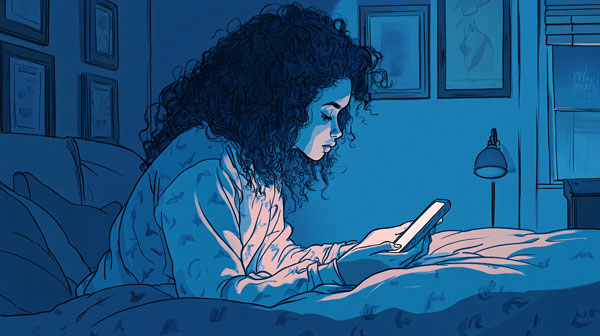Using smartphones at night is depriving teens of sleep and damaging their vision and mental health

[Adolescent & smartphone. Photo Credit: Pixabay]
In April 2025, a wave of medical reports and national surveys revealed that more than 90% of Korean adolescents are chronically sleep-deprived, with excessive screen time and rigid school schedules driving both deteriorating sleep quality and increasing rates of myopia.
Health experts warn that if these trends persist unchecked, they could have lasting consequences on students’ mental health, cognitive capacity, and overall well-being.
A comprehensive meta-analysis published in JAMA Network Open found that each additional hour of daily screen time increased the risk of developing nearsightedness by 21%.
When screen use exceeded four hours per day, the risk rose even more sharply.
Dr. Victoria Chen, an ophthalmologist at UCLA, noted that using smartphones and tablets at close range places prolonged strain on the eye muscles, potentially accelerating myopia progression.
“What we’re seeing is not just a temporary effect; these habits may have lifelong implications,” she explained.
Sleep deprivation, closely linked to excessive screen use, is another mounting concern.
Professor Ki-Young Jung of Seoul National University Hospital and president of the Korean Society of Sleep Research emphasized that using smartphones before bed disrupts natural circadian rhythms, making it difficult for students to fall asleep on time.
He noted that approximately 90% of Korean middle and high school students sleep less than seven hours a night, which is well below the recommended 8~10 hours, with about 10% getting under five hours of sleep.
Such patterns are often fueled by late-night cram school schedules, followed by social media use and early morning classes.
The psychological ramifications are severe.
A longitudinal study from Stanford Medicine revealed that children who experienced sleep disturbances were 2.5 times more likely to develop suicidal thoughts or behaviors within two years.
Similarly, a BMC Psychiatry study examining 96,000 American high school students found a 2.6-fold increase in suicide attempts among those who regularly slept fewer than four hours.
Researchers attribute this to a domino effect: chronic sleep loss undermines emotional regulation, increases impulsivity, and heightens vulnerability to depression and anxiety.
To address this growing crisis, public health specialists and education leaders are advocating for systemic reform. One widely endorsed initiative is delaying the start of school.
Studies from the U.S. and Europe have shown that even a one-hour delay in the school day can result in increased sleep duration, improved academic performance, and enhanced emotional stability.
In Minnesota, a high school that shifted its start time to a later time reported a 40% improvement in student GPA across multiple subjects.
In Korea, experts propose that pilot programs tailored to adolescent biological rhythms could serve a practical first step.
Monitoring students’ sleep and emotional health through regular assessments is also critical.
According to the CDC, teenagers who sleep fewer than eight hours per night are far more likely to experience depressive symptoms, suicidal ideation, and chronic fatigue.
Experts recommend that schools implement screening systems that connect students showing warning signs to appropriate mental health support.
On an individual level, behavioral adjustments can also play a significant role.
The Sleep Foundation reports that practicing a 'digital detox' - avoiding screens for at least one hour before bed - helps reduce brain stimulation, promotes melatonin production, and leads to deeper, more restorative sleep.
Teens who adopted this practice reported feeling more rested and mentally alert during the day.
Experts emphasize that addressing teen sleep deprivation is not solely a matter of personal or individual discipline.
A cultural shift is needed, one that views sleep as a vital foundation for healthy development.
Teachers must be equipped to recognize and respond to poor sleep habits. Parents should set consistent nighttime routines that limit screen exposure.
And schools must treat sleep as essential infrastructure for mental health and learning, not an afterthought.
In a society where academic pressure and digital distraction often take precedence, protecting sleep must become a moral imperative.
The science is precise: without sufficient rest, adolescents are left vulnerable to cognitive decline, emotional imbalance, and even life-threatening mental health issues.
Ensuring that students get sufficient sleep well is not just a lifestyle issue; it is an urgent public health mission.

- Aiden Been Jo / Grade 11
- Ssangyong High School

![THE HERALD STUDENT REPORTERS [US]](/assets/images/logo_student_us.png)
![THE HERALD STUDENT REPORTERS [Canada]](/assets/images/logo_student_ca.png)
